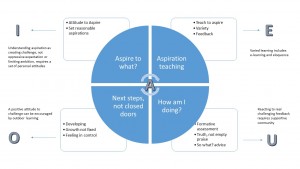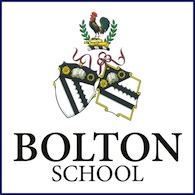Over the next few months, IÆll be writing about the ævowelsÆ of education: aspiration, e-learning and eloquence, I (getting along with yourself), outdoor learning and U (getting along with others).
So, A is for Aspiration
Aspiration is a much used word in education but is nothing like as easy as it sounds. When used a glib throw away it is all about æachieving potentialÆ, æhaving dreamsÆ andÆ making somethingÆ of yourself. Arguably quite a few young people do have aspirations û to win the lottery, to be a celebrity or play premiership football. The problem is these are often neither realistic nor, in the end, worthwhile. We have the classic pupil teacher divide: What we mean by aspiration is not what they mean by aspiration.
First, we need to establish the attitude to aspire and to aspire for the ærightÆ things. Then we need to set reasonable aspirations. If we are talking exam results then that requires care: grades too high will be unachievable, grades too low will be non-aspirational. And in doing all that we need to be mindful of another vowel (the I). How you react to aspirational grades, neither seeing them as an unachievable burden of expectation nor or as curtailing ambition and ruining dreams, requires a set of personal skills that schools need to develop at the same time as creating an aspirational culture.
Having set those aspirational grades then we need to teach to aspire. That includes all the usual variety of the classroom and, above all, decent feedback on work. That feedback will not be marks and results, it will be description and based on things that lead to actions. Whilst if you wish to be 100m champion running a lot of races and timing them does no harm, detailed and focused coaching on technique makes the difference in the end. As before, we link with another vowel, E, as without doubt e-learning has immense potential in driving the quality of feedback to pupils.
There will be times, though, when we need to know how things are going and get a current grade to match to the aspirations. This, too, is not at all as easy as it sounds. What does a piece of work in year 8 look like that will lead to an A* in Year 11? It is clearly not a GCSE question marked to the formal mark scheme. In a school focused on using aspirational grades then those internal progress tests need hard work and clear thought to measure what we want them to measure. Then, when we have the grade and compare it to aspirations, we must tell the truth to the pupils. We must neither praise falsely nor indulge in the crude weapon of marking down to improve work ethic (only teachers ever seem to think that way and never about themselves û not one of them would appreciate being told they were less good than they are to make them work harder!). We must simply say things as they are with some clear æSo what?Æ advice on how to move forward. Hearing challenging advice and acting on it not only involves the vowel I but also the vowel U û we need the right spirit in the school to work that way without pupils suffering self-esteem issues.
Finally, in pursuing aspirations there must always be next steps rather than closed doors. That involves many aspects of school life: a growth mind-set, with no one defining themselves other than by reasonable aspiration; pupils feeling in control because they know what they should be doing, what they are doing and what to do next; and a sense of developing, always developing. Those attitudes, knowing yourself, pushing boundaries, a strong shared ethos û all can be so well nurtured by the final vowel O.
Certainly, if a school aspires to be aspirational, there is more to it than using the word!


Leave a Reply